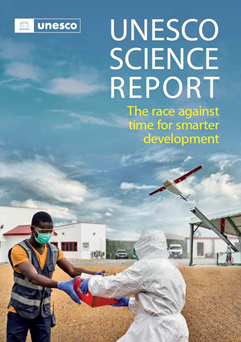ECOSF Participated in the Virtual Launch of 7th edition of UNESCO Science Report ‘The Race against Time for Smarter Development’
Go Back

 UNESCO virtually launched the 7th edition of the Science Report ‘The Race against Time for Smarter Development’ during a virtual ceremony held on June 11 which featured a video and expert discussion on the report’s key findings. UNESCO Director-General, H.E. Ms. Audrey Azoulay, and Assistant Director-General for Natural Sciences, Ms. Shamila Nair-Bedouelle presented their remarks during the launch. The Editor-in-Chief of the report, Dr. Susan Schneegans provided an overview of trends in their region. These regional overviews were followed by a Q&A session. President ECOSF Prof. Dr. Manzoor Hussain Soomro as one of the science leaders was invited and participated in the virtual event.
UNESCO virtually launched the 7th edition of the Science Report ‘The Race against Time for Smarter Development’ during a virtual ceremony held on June 11 which featured a video and expert discussion on the report’s key findings. UNESCO Director-General, H.E. Ms. Audrey Azoulay, and Assistant Director-General for Natural Sciences, Ms. Shamila Nair-Bedouelle presented their remarks during the launch. The Editor-in-Chief of the report, Dr. Susan Schneegans provided an overview of trends in their region. These regional overviews were followed by a Q&A session. President ECOSF Prof. Dr. Manzoor Hussain Soomro as one of the science leaders was invited and participated in the virtual event.
The UNESCO Science Report is a global monitoring report published regularly by the United Nations Educational, Scientific, and Cultural Organization (UNESCO). Every five years, this report maps the latest trends and developments in national and regional science policy landscapes, against the backdrop of shifting socioeconomic, geopolitical, and environmental realities.
The 7th edition of the UNESCO Science Report’s subtitle, ‘The Race against Time for Smarter Development’ captures the urgency to rethink development models by 2030, the deadline for reaching the United Nations’ 17 Sustainable Development Goals. Since 2015, most countries have aligned their national policies with the 2030 Agenda for Sustainable Development and are engaged in a gradual transition to ‘green’ economies. Governments are stepping up support for smarter production and consumption systems.
In parallel to their green transition, governments are digitalizing public services and payment systems to improve service delivery, support business and combat corruption and tax evasion. Policies are fostering the emergence of a digital economy, including smart manufacturing, smart finance (fintech), smart health care services like telemedicine and smart agriculture. The report’s subtitle is also an allusion to this form of ‘smarter development’ driven by digital technologies such as artificial intelligence (AI) and robotics, big data, the Internet of Things and blockchain technology which are converging with nanotechnology, biotechnology and cognitive sciences to form the bedrock of the Fourth Industrial Revolution (also known as Industry 4.0).